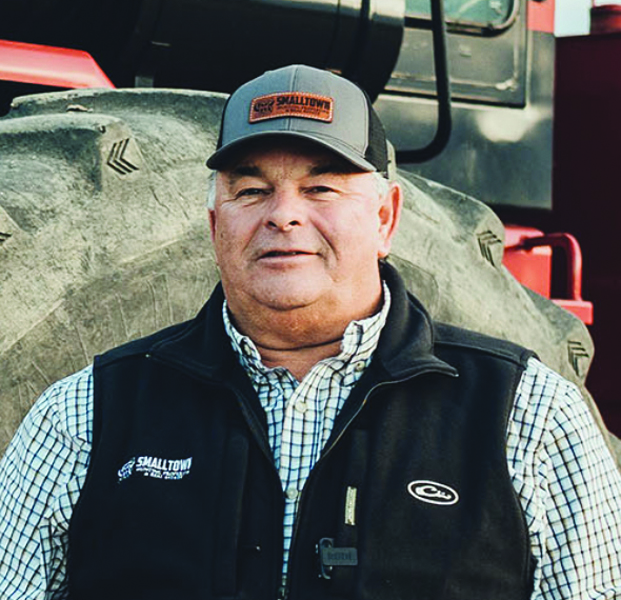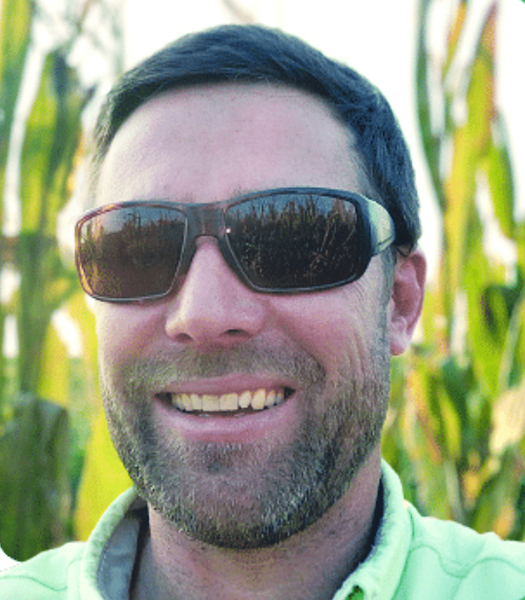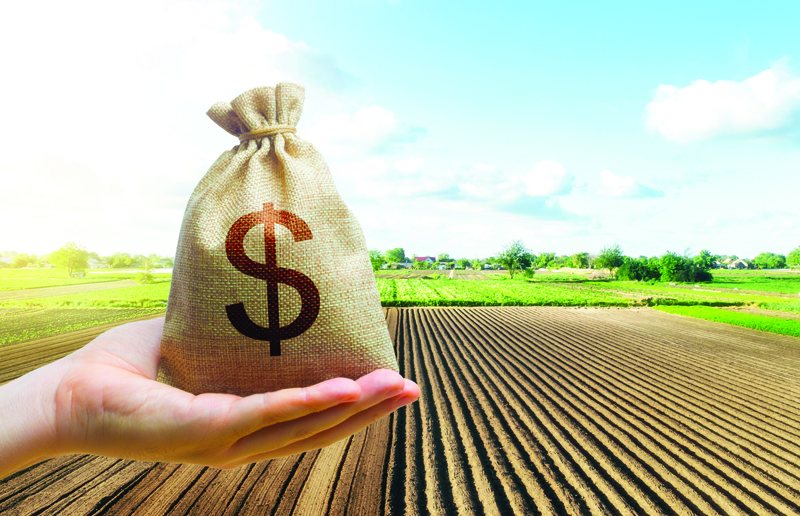Region’s resource has become a precious commodity
Delta dirt. The Mighty Mississippi River deposited plenty of value for generations to be discovered when the trees were cleared and the silty land remained. Since then, farmers have been making a living with cotton, soybeans, corn, rice, wheat and more. Generations of families continue to make a living plowing, planting and harvesting. Delta ag land is a precious commodity and as Mark Twain once said, “Buy land. They’re not making it anymore.” Especially, Delta dirt.

Early on, it was farmers who strived to buy the land and survive on their skills of cultivating what grew but the land continued to valuate. These days investors are looking for Delta dirt and paying top dollar. In 1979, Henry Mosco bought 40 acres of Delta ag land to start his farming career.
“Most of that land was around $400 to $500 dollars an acre,” said Mosco. “And then in the 80s it went to $1,400 to $1,500 an acre but the interest rate was 16% to 18%. I was trying to buy some and it just wouldn’t work. Then it went to hell at the end of the 80s. The folks who had bought that land and paid that high interest were just grasping at straws. And then land went back down and stayed down until the early 1990s when it started going back up.”
The farmer and ag land realtor with SmallTown Hunting Properties and Real Estate noted, “Today, ag land is holding steady. There’s not very much on the market. The ag industry right now is as bad as it’s been across the US with the market prices falling 20% to 30% while input prices steadily increase. There is a lot unknown right now but the land values have held. And we do have people looking to buy land and most of them are investors.”
However, all Delta dirt is not the same. There are different types of soil—sandy loam, buckshot and gumbo are terms used to describe the silty dirt. Then there is dirt that has been land formed to hold and move water to benefit crops. There is land that is irrigated or not. Each factor plays into the create the value of each acre. Dr. Steve Martin has been around Delta ag land for decades working with the Mississippi State Extension Service. The retired director of the Stoneville’s Delta Research and Extension Center for the Mississippi State Extension Service now serves as an economist for DREC.

“It’s been a good investment for a long time. And that’s true of crop land in the Midwest and other places too. As the old saying goes, they’re not making any more of it,” said Dr. Martin. “Irrigated, non-irrigated is certainly an important part of it. But then you have about five classes of soils. What divides those classes is their productivity. They’re all good. Everything in the Delta is fertile.”
Today’s price per acre, according to Martin, “Delta cropland is going to range anywhere from $4,000 to $7,500 an acre just depending on how big a track it is and what kind of land it is if it’s irrigated not irrigated.”

Gwin Smith, President, Owner, and Co-Founder of Rutledge Investment Company in Memphis knows a little bit about Delta ag land. He grew up working on a family farm in Cleveland in the heart of the Mississippi Delta. He started out as a real estate appraiser before co-founding Rutledge.
“I started out as a farmland appraiser and farmland values were as low as $400 and some odd dollars an acre. That was for the worst land. The better land probably got as low as $600 or $800,” said Smith.
He notes the current farming financial climate looks similar to the problems of the 1980s.
“Usually, the things that get the real estate market is the over-leverage. I know a lot of farmers remember this. But not a lot of people that are farming today had any experience with this. This year’s probably the first experience a lot of younger and farmers about 60 and below have had with this. That’s one of the things that’s kind of interesting to me, how people adjust to this. It was land prices and the situation then. Because right now they’re holding up pretty good, especially for really good land, which there’s not a lot of just land that’s not precision leveled.”
Smith noted that one of the larger issues facing farmers next year will be how financially capable they are and will their crop lender be able to make them a crop loan.
“Land value has tripled since 2009,” said Smith. “There’s been a lot of good years and a lot of people that own really good land have leveled it and developed it and got it in really good shape and borrowed money that they needed for that. A few years ago, they were lending money at 3% and 4% and they’ve really got themselves set up with a low interest rate and a lot of equity in their land because it’s done such a big jump. There’ll be a lot of farmers that are very financially strong. But the tenant farmers have not been capable of buying a lot of land, they’ve been able to buy equipment and rent land and do pretty well. When things get a little tough like this, they don’t have any farmland to fall back on.”
There is talk of federal help coming from Washington, D.C. At press time, Congress was working on getting the 2018 Farm Bill extended again and was trying to add in benefits and financial relief for farmers who suffered through this past growing season.
“If it passes, boy, will it be the Christmas present of all Christmas presents. I’ve got a client that said he would receive $600,000 for last year. He needs that $600,000. That’s a lot of money to add back into your losses.”
But farmland it still a great investment—an outstanding investment —despite the down year.
“My family owns farmland down in Cleveland,” said Smith. “I could sell it for a ton of money but I wouldn’t recommend selling it. One reason farmland that’s really gotten strong is there’s a lot of private equity and investment funds and pension funds and Bill Gates and others are buying farmland. They have funds set up to buy farmland and they buy a lot of it as a way to diversify. People that put their money in it are like pension funds.”

Jacob Sartain of Sartain Heritage Properties has been in ag land sales for the past two decades but his family’s company has been in the business for more than 70 years. He explained in the early 2000s, “good farmland, high-quality farmland sold for $2,500 an acre. That’s when institutional money moved in due to the stability of the asset with irrigation and stable yields and stable rainfalls. When these companies were looking harder at assets, the farmland in our region started going up and they’ve been on a pretty wild ride upwards ever since then.”
In his estimation, “These days sales in the market are anywhere from $4,000 to $7,500 dependent on soil quality, land improvements such as irrigation. It’s a great investment. He noted the bigger blocks of land go for a higher price as investors are looking for large tracts of land—500 acres or more.”
He also explained that renting those acres runs anywhere from $180 to $225 per acre.
“There are some cases where the rent’s higher than $225 and there are cases where the rent’s lower than $180. But this is where yield becomes attractive. You’ve got the appreciation value of the asset. We want our investors to look at the asset on a 10-year scale. If you can look at it through that lens, then it shows that those farms are going to end up yielding you somewhere around 10% annual growth from combined growth rate of appreciation. But you need 10 years to realize that level of graduation. That $1 million bucks turns into $2 million. There’s certainly cases where the growth is much faster than that. In 2023, Delta states farmland appreciation plus income averaged 13.9 percent.”

Chris Williams, Vice President of Lending at the Mississippi Land Bank has been in the business for 12 years. He explained the tough year farmers just experienced hasn’t affected land rents yet.
“There’s kind of been two markets around here. There’s been the investor market and then the local market. Investors were always willing to pay a little more, a little premium for the property. But recently we’ve not seen as much of that in our territory,” Williams said.
The Mississippi Land Bank handles land financing, crop financing, equipment loans and more for landowners.
“We are part of the farm credit system which is a government-sponsored enterprise. We are just like a commercial bank. We are funded and regulated through Farm Credit Association. We are privately owned but federally regulated.”
Williams also explained, “The last decade has been pretty good in commercial agriculture, especially in the row crop side. And guys have been able to build good balance sheets, build good working capital. And over the last, I guess, 12 months the reality of the falling commodity prices has set in. And that’s going to force them into having access to the equity of their farmland that they’ve been able to build over the last eight to 10 years. Some of them may end up having to sell.”
They’re not making any more Delta dirt and the value only continues to increase as farmers and investors vie for it to build their futures.


